UN representative begins 10-day probe into Canada's Indigenous Peoples
Unmarked graves, missing, murdered women, girls key subjects

TRENTON, Canada
A special UN representative began a 10-day probe Wednesday into Canadian Indigenous issues, including missing and murdered females and former Indian residential schools.
The investigation is being conducted by UN Special Rapporteur on the Rights of Indigenous Peoples Cali Tzay, a Mayan Kaqchikel Indigenous from Guatemala.
Tzay's probe is needed to spotlight the treatment of Canada's three Aboriginal Peoples -- First Nations, Inuit and Metis, said Kenneth Deer of the Haudenosaunee Confederacy made up of five First Nations.
"Canada has this altar boy image out there that everything is wonderful," said Deer. "We need people like the special rapporteur to focus on human rights violations that take place within Canada. It helps keep Canada to account."
Deer will meet Tzay on Thursday and plans to bring up several issues, including Canada's failure to acknowledge the Confederacy as a government, unmarked graves at former Indian Residential Schools and murdered and missing Indigenous women and girls.
To date, about 2,000 unmarked graves have been discovered at various residential schools and at least 4,000 indigenous females are thought to have been murdered or disappeared between 1980 and 2012, according to the Native Women's Association of Canada.
Prime Minister Justin Trudeau has called the treatment of Canada's Indigenous Peoples "genocide."
The UN's human rights office said the scope of Tzay's investigation includes the implementation of the UN's Declaration on the Rights of Indigenous Peoples (UNDRIP) and the right to self-government and ownership of land and resources.
Tzay will meet government officials as well as leaders representing the three Aboriginal groups.
"We hope that this will be a first of many meetings where we can share issues that many Métis citizens face in Canada, with a look to a strong future of working together to ensure UNDRIP is implemented for all Indigenous Peoples, wherever they are located," Metis National Council President Cassidy Caron said in a statement to CBC News.
Anadolu Agency website contains only a portion of the news stories offered to subscribers in the AA News Broadcasting System (HAS), and in summarized form. Please contact us for subscription options.




